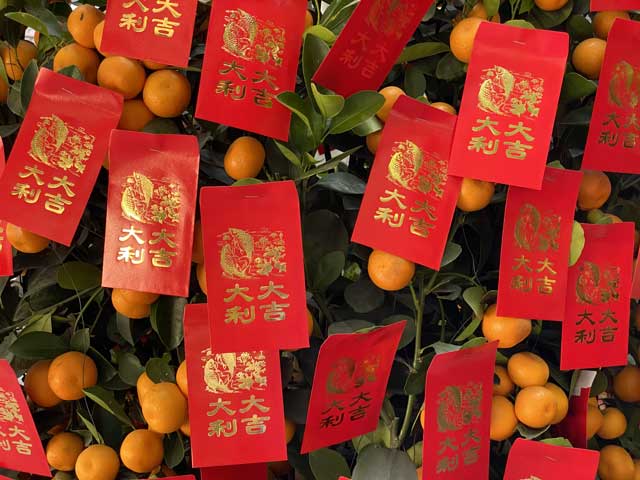“Lucky Red Envelopes” and Other Ways to Bring in Luck for Chinese New Year

Unsplash Yuwei Shaw
“新年快乐” (xīn nián kuài lè) or “Happy New Year” is a common greeting during Chinese New Year. And Chinese New Year is one of the most important holidays in China. This cultural holiday has influenced different celebrations across its neighboring cultures like the Losar of Tibet, Korean New Year, and Tet otherwise known as Vietnamese New Year.
Chinese New Year is also celebrated all over the world. You can experience Chinese New Year celebrations in Singapore, the Philippines, Myanmar, Thailand, Cambodia, Malaysia, Mauritius, Taiwan, Indonesia, Canada, North America, and Europe.
The Chinese New Year, also known as the Spring Festival or Lunar New Year, is a time for family and friends to get together. It is celebrated for 15 days with many traditional customs and activities – a way to celebrate the beginning of a prosperous new year.
The day of Chinese New Year is determined by the Chinese Lunar calendar, which always falls on a new moon. The exact date of the holiday changes from year to year, but it’s always between January 21st and February 20th. This year's Chinese New Year is on February 1st, 2022.
The Lunar New Year is a celebration packed with auspicious rites and festivities, all in the hopes of a prosperous year ahead. Below are eight of the most common Chinese New Year traditions to bring you good health and great luck this year ahead!
May you be happy and successful this year!
May good fortune fall upon you!
And may all your wishes come true!
Decorations for good fortune
In Chinese culture, the color red represents fortune, abundance, wealth, and happiness. So on Lunar New Year, most, if not not all places, will be decorated with the scarlet color. Festive red decorations will be hung up in streets and houses to keep off Nian, a dragon monster who is afraid of the color red.
Visiting friends and family
Lunar New Year is a special holiday that is celebrated with friends and family, together from all around the world. The Chinese New Year's Eve dinner, also known as "reunion dinner," is considered to be the year's most important meal of the year. After the lavish dinner, families stay up late to welcome the Chinese New Year by watching the famed Spring Festival Gala.
From the fourth to seventh day of the holiday, people visit friends and other families to wish each other a Happy New Year. People offer gifts as tokens of affection and love throughout the visit. Tea and tonic foods like ginseng and goji berries are some of the popular gifts.
Eating traditional and delicious food
During the Chinese New Year's Eve feast or the family reunion dinner, a range of traditional and auspicious meals are served. Five popular dishes include: steamed fish – served with the head and tail to avoid bad luck, noodles – for long life, pork – a symbol of a rich life, shrimp – to wish for a happy life, and chinese dumplings – for wealth and prosperity.
Giving red envelopes
The lucky red packets, also known as Hong Bao or the Chinese New Year red envelope, are given away on significant occasions such as birthdays, weddings, and, most notably, the Chinese New Year.
According to Chinese legend, the practice began as a means of protecting children from a Chinese monster who would come after the sleeping kids on New Year's Eve. Today, these bright red and gold packets are often given to children, friends, and family members as a symbol of good luck.
There are rules surrounding the giving of the lucky envelopes. Only crisp, clean money should be inserted into envelopes. The amount of money in the hongbao should never include the number 4 (4, 40, 400, or anything else with 4) since the number 4 sounds like death in Chinese. And it’s ideal to give amounts that begin or end with the number 8 for more luck and prosperity.
Watching Dragon and Lion Dances
The Chinese New Year's traditional dragon and lion dances are said to bring good fortune and wealth. As both figures – dragons and lions – are considered to be lucky symbols in imperial China. The longer the dragon is in the Dragon dance, the more luck is delivered to the community. And lions are considered auspicious because they chase away the evil spirit Nian.
Making some noise
In ancient Chinese times, it was believed that the loud sound of firecrackers scared away evil spirits who brought bad luck. Nowadays, noisy activities are recommended during the Chinese New Year celebration to drive away evil spirits. Firecrackers are popular and can be heard all over the streets to express happiness and wish for good luck.
Praying at the temple
Another important Lunar New Year ritual is visiting Buddhist temples to pray and worship. Praying and worshipping in temples is said to bring good fortune throughout the year. Worshippers flock to the Buddhist temple in the early morning hours wishing for happiness, wealth, and longevity.
In religious places, joss sticks are lit to wish for good luck and health. The bells are also rung to mark the beginning of a new calendar year. But according to Chinese tradition, the bell must be struck 108 times, with the 108th ring falling at midnight to assure everyone's good fortune.


